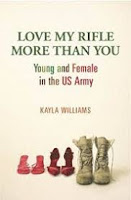Love My
Rifle More Than You: Young and Female in the US Army, by Kayla Williams
(Norton, 2005, 290 pages, $24.95)
First read it years ago. More
recently, for a veterans’ book club. Loved it then, love it now.
Love My Rifle More Than You is the book your mother should not read before her first daughter goes
off to boot camp or deploys or even goes away to college, but I loved it – ah!
the excitement, the fast pace, the swearing, the Army slang and terminology
that was once so familiar. What will turn up next just around the corner? Will
our hero talk back to her superior again – and get away with it? And what about
the alcohol, the drugs, the sexual tension, the weapons and ammo, the absurdity
of it all, the danger, the lack of sleep, the dirt and rain and heat and sand
and stench, and the guys (mostly a few years younger than author Kayla Williams):
some of which she encountered before the Army? And why the Army, anyway? Was
she desperate or did she want to test herself, to see if she could do it, to
find out what she was made of?
Joining the Army was almost
anti-climactic for Williams, in her mid-twenties, a bit older than your average
boot camper. She had been married. She had had an Arabic boyfriend. She had a
college degree. She even had a house.
Ah, but the excitement, the
danger, the alcohol, the big guns, the guys (OK, they were smelly and dirty
after days in the desert but so were the female soldiers), the absurdity of so
many war-time decisions, the unleadership of so many NCOs and junior officers,
the fast pace, the Army slang and terminology, the lack of sleep, the swearing,
the drugs, the sex or lack thereof, the weapons and ammo – not your father’s
war or your grandfather’s war.
But, Wait!
But, wait a minute! I was deployed,
too. I had the same training as the author (but of a much higher rank). But
none of this happened to me. Part of me wishes it had. But then I can always
read about it happening to someone else. . . . .
I do know that some similar
situations Williams encountered did occur in the Army: I had group conversations
with other female soldiers with jobs that differed from mine who recounted
similar stories, but the field of military intelligence (MI) (and the medical
field, too) is more civilianized, more academic (intellectual) than others so
Williams’ experience with other MI soldiers did surprise me. Not that I
disbelieve her: I just think her situation was really rare.
Writing Style
Again, a fast pace that keeps
you going. I finished it in less than a week.
Lots of dialogue and short
paragraphs that make you not want to put it down but, instead, to keep reading
to find out what happens next.
What You Will Remember, What Will Stay With You
The first time through, I had
been closer in time to my own deployment as a female MI soldier and I don’t
recall the swearing and sex-talk in the book. I do recall the author’s small
unit on the mountain and knew that she had married a wounded soldier (not in
the book but somehow I knew).
This time through, perhaps
because a group of male veterans was reading Love My Rifle for our veterans’ book club and remarked on the
rawness of the writing, I will remember the language and the camaraderie
typical of the military and the absurdity of so much.
This tale (or series of
tales) is riveting. We only wish she had told us more about boot camp and the
schools she attended to learn her military specialty. We also suspect there was
more to being deployed to Iraq – more formations, more paperwork, more military
‘stuff.’ And we wonder how she found the time to read 200 books in less than a
year.
All in all, read Love My Rifle with a grain of salt. As
an adventure, it is above and beyond!
And now, I’m off to get her
sequel, Plenty of
Time When We Get Home: Love and Recovery in the Aftermath of War.
----------------------------------------------------------------------------------------------------
Caveat: this time around, I received the book as part of a grant for a
veterans’ book club.



No comments:
Post a Comment